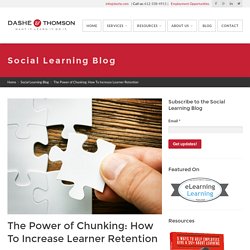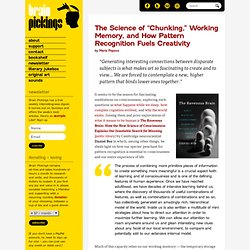

Put your memory to work. Sometimes when I’m trying to focus on a single task my mind can feel a bit like a pinball machine.

No matter how hard I try to keep my thoughts in focus there’s all these ideas wildly bouncing around and beating away at my limited attention. The Many Ways our Memory Fails Us (Part 3) (Purchase a copy of the entire 3-part series in one sexy PDF for $3.99) In the first two parts of our series on memory, we covered four major “sins” committed by our memories: Absent-Mindedness, Transience, Misattribution, and Blocking, using Daniel Schacter’s The Seven Sins of Memory as our guide.

We’re going to finish it off today with three other sins: Suggestibility, Bias, and Persistence, hopefully leaving us with a full understanding of our memory and where it fails us from time to time. Suggestibility. Boost Your Brain Power: 7 Tips for Improving Your Memory. Surely, constantly forgetting what you were doing in the middle of doing something and constantly looking for your misplaced house keys is not the ideal way to spend your golden years.

Don't wait until it is too late to start thinking about improving your memory. If you are bad at remembering simple to-do tasks, other people's names, your girlfriend's birthday, and other relevant pieces of information, use some of the most useful mnemonic devices illustrated below to help you retain things more permanently in your brain space. More importantly, be sure to practice good physical and mental health habits on a regular basis to keep your memory and brain stamina high. Get adequate sleep, eat healthy, and exercise frequently. Joshua Foer: Feats of memory anyone can do. The forgetting curve explains why humans struggle to memorize. Media mogul Rupert Murdoch, 86, had the future of his empire all secured, agreeing last year to sell 21st Century Fox to Disney’s Bob Iger for $52 billion.

Included in the deal was the 39% of European pay-TV giant Sky that Fox owns. Then Comcast CEO Brian Roberts, 58, decided to stir the global media pot. Memory Tricks to Help You Learn by Real Business. It didn’t take long for Santiago Paiva, a data science researcher at Montreal-based Busbud, to see the difficulties in using rote memorization to learn Portuguese.

“There are two ways to learn how to say ‘please’ in Portuguese,” says the Spanish and English speaker. How to never forget the name of someone you just met: The science of memory. 4.3K Flares Filament.io 4.3K Flares × How would you like to be able to recall the name of a client or associate you just met?

How would you like to go to the bank and not fumble for your account number every stinking time? Everyday scenarios like these are classic examples of our need for memorization. The function of memory has so many more applications, too—public speaking, schoolwork, studying, research, the list goes on and on. Memorizing is a key function in so many areas. The Power of Chunking: How To Increase Learner Retention. In 1980, K.

Anders Ericsson and his colleagues published a fascinating experiment. They took a student of average intelligence, memory capacity, and IQ and had an experimenter test the limits of his memory. The experimenter read a series of random numbers and then had the student recite them back in the exact order. If he was able to recite the numbers in the correct order, the experimenter would add another digit to the next random set.
If he made a mistake, the next set of random numbers would be one digit shorter. At the beginning of the experiment, the student proved his average intelligence and memory by only being able to memorize a sequence of about 7 numbers. Learn Memory Techniques - Memorise.org. Learning Hacks That Will Maximize Your Memory. Psychology: A simple trick to improve your memory. Want to enhance your memory for facts?

Tom Stafford explains a counterintuitive method for retaining information. If I asked you to sit down and remember a list of phone numbers or a series of facts, how would you go about it? There’s a fair chance that you’d be doing it wrong. One of the interesting things about the mind is that even though we all have one, we don't have perfect insight into how to get the best from it.
This is in part because of flaws in our ability to think about our own thinking, which is called metacognition. One area where these blind spots are particularly large is learning. How to Tighten Your Grip on Your Memory. Pneumonic devices.

Singing. The old write-on-the-back-of-your-hand trick. The Science of "Chunking," Working Memory, and How Pattern Recognition Fuels Creativity. By Maria Popova “Generating interesting connections between disparate subjects is what makes art so fascinating to create and to view… We are forced to contemplate a new, higher pattern that binds lower ones together.”

Mental block: Professor discovers way to alter memory. June 4, 2013 — A series of studies conducted by an Iowa State University research team shows that it is possible to manipulate an existing memory simply by suggesting new or different information. The key is timing and recall of that memory, said Jason Chan, an assistant professor of psychology at Iowa State. "If you reactivate a memory by retrieving it, that memory becomes susceptible to changes again. And if at that time you give people new contradictory information, that can make the original memory much harder to retrieve later," Chan said.
One of the major findings from the studies, published in the latest issue of Proceedings of the National Academy of Sciences , is the impact on declarative memory -- a memory that can be consciously recalled and verbally described, such as what you did last weekend. The effects are powerful because people are retrieving memory and then incorporating new information. MIT Neuroscientists Can Implant Fake Memories into the Brain. Susanne Posel Occupy Corporatism July 29, 2013 Scientists at the Massachusetts Institute of technology (MIT) have developed a technique to implant false memories into the minds of laboratory rats. Steven Ramirez, lead author of the study from MIT identified brain cells associated with specific memories and used a technique to alter the rat’s memory once it was isolated.
In principle, this experiment could be recreated on human subjects and have a similar level of success. Ramirez hopes that this study would lay a foundation of future research that could become a therapy for emotionally disturbed individuals, treat those with emotional problems such as post-traumatic stress disorder (PTSD) which involves the recollection of “unwanted memories”. In the laboratory, Ramirez’ team used optogenetics which utilizes light to turn on or off brain cells with an optical fiber that is shown directly into the hippocampus (the region of the brain that controls the formation of new memories). False Memories: When Your Brain Makes Stuff Up. Correction appended 11/20/13, 10:18 AM It’s easy enough to explain why we remember things: multiple regions of the brain — particularly the hippocampus — are devoted to the job. It’s easy to understand why we forget stuff too: there’s only so much any busy brain can handle.
Study: For Memory, Hearing Is Worse Than Seeing or Feeling - Julie Beck. Participants were significantly better at recalling things they saw and touched than audio recordings they heard. Jim Linwood/flickr Problem: It’s not that you weren’t listening when your mom/partner/roommate asked you to pick up more toilet paper on the way home. You just forgot. An honest mistake. The Science of Memory (and 4 Uncommon Ways to Enhance It) I have a pretty bad memory, it seems. I know people say that all the time, but here’s why I think it actually applies to me: In pretty much all of my childhood memories, I’m around 10 years old, as if nothing ever happened before that.My poor co-founder, Josh, has to replay almost entire conversations before I recall having had them.
On a regular basis.Unless my high school was running way off the curriculum, I just don’t remember anything I learned there. Sharp-Wave Ripples Link Memory and Decisions. Over the past few decades, researchers have worked to uncover the details of how the brain organizes memories. Much remains a mystery, but scientists have identified a key event: the formation of an intense brain wave called a “sharp-wave ripple” (SWR).
Thinking Straight in the Age of Information Overload. The Organized Mind: Thinking Straight in the Age of Information Overload, a book by Daniel Levitin, explores “how humans have coped with information and organization from the beginning of civilization. … It’s also the story of how the most successful members of society—from successful artists, athletes, and warriors, to business executives and highly credentialed professionals—have learned to maximize their creativity, and efficiency, by organizing their lives so that they spend less time on the mundane, and more time on the inspiring, comforting, and rewarding things in life.”